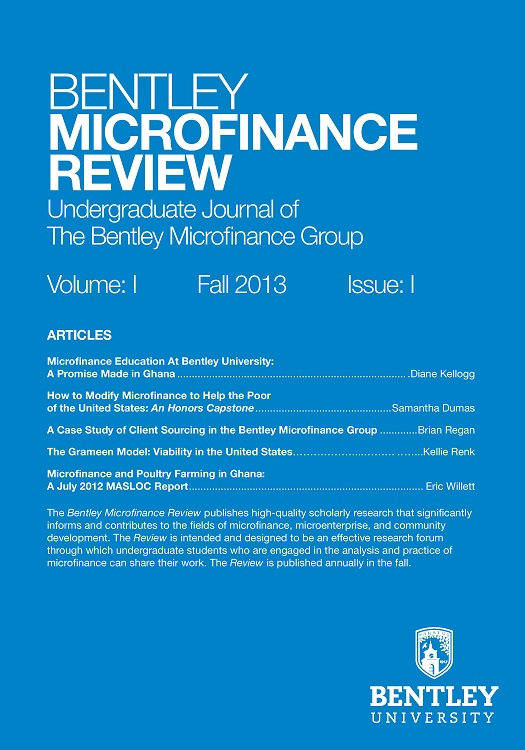
 When the Bentley Microfinance Group (BMG) was launched in 2008, artisan Frank Burns was the group’s second microloan recipient. Five years later, a lot has changed for both sides. Burns is selling handmade pieces in the woodworking studio. The $800 loan he took allowed him to purchase materials to produce more pieces. The 40-member student-run organization has made a total of five microloans, and recently published one of the first student-edited, student-run, microfinance journal.
When the Bentley Microfinance Group (BMG) was launched in 2008, artisan Frank Burns was the group’s second microloan recipient. Five years later, a lot has changed for both sides. Burns is selling handmade pieces in the woodworking studio. The $800 loan he took allowed him to purchase materials to produce more pieces. The 40-member student-run organization has made a total of five microloans, and recently published one of the first student-edited, student-run, microfinance journal.
Among the loan recipients: a women’s empowerment publisher, a minority general contractor, and a boutique jewelry and clothing store. BMG also made a $10,000 gift ceded to The Ghana Program. Directed by Bentley management professor Diane Kellogg, the educational partnership between Bentley and multiple businesses, communities and NGOs in Ghana supports initiatives such as Ghanaian women building a local poultry business and local entrepreneurs working at the crossroads of public health and sustainability.
The journal, Bentley Microfinance Review, was officially launched at a September 14 campus event. The student-managed publication, which showcases student research in microfinance, microenterprise, and community development, is edited by a faculty and student board. BMG members source articles through Bentley’s Honors Program, courses such as expository writing and GLS, and student initiatives such as The Ghana Project.
The Bentley Microfinance Group first started under then-finance professor Roy “Chip” Wiggins (now Dean of Business) and Diane Kellogg with a class of senior honors students who developed a business plan to create a student-run microfinance organization. The mission is to raise awareness about microfinance in the Bentley and Boston communities through the practice of microfinance. This is accomplished through:
- Education: Provide Bentley students, faculty and staff with practical experience, encourage their awareness of microfinance practices, empower them to develop a framework for change and facilitate the education of the borrowers from BMG to extend the academic community;
- Community Development: Promote development of the local community by providing credit and services to those excluded from traditional financial markets;
- Operational Sustainability: Operate and maintain a cash-flow neutral/positive loan portfolio, covering or exceeding operational expenses with interest income and student sweat equity; and
- Innovation: Develop a new microfinance paradigm locally and openly scale the model globally.
After early planning efforts and funding initiatives (the initial $125,000 was raised in the Bentley parent and alumni community), the group has evolved.
“One of our biggest challenges now is our succession planning procedures,” says Wiggins. “As a business we need to ensure that we can maintain a sustainable practice. We loan money to the community, and without a proper succession plan it would be easy to miss collections on loans.”
The group is seeking to increase the diversity of its members to become more reflective of the Bentley community and of loan recipients, many of whom are minorities.
“This will be a competitive advantage for our group because it will allow us to connect with potential clients who may speak another language, for example,” says Bentley junior Michael Mazmanian, executive vice president of BMG. Mazmanian.
The group also plans to grow marketing efforts from referral-based partnerships to include outreach to local small business owners and entrepreneurs.
In addition to opening up doors for community members, BMG has created a successful model for student learning. Part of that is hands-off teaching, which may seem counter-intuitive at first blush.
“When we [students] were developing the journal, faculty advisers allowed us to make mistakes and learn how to overcome obstacles,” says Mazmanian. “Today, we have a one-of-a-kind student-managed journal that showcases our hard work and shares important student research.”

